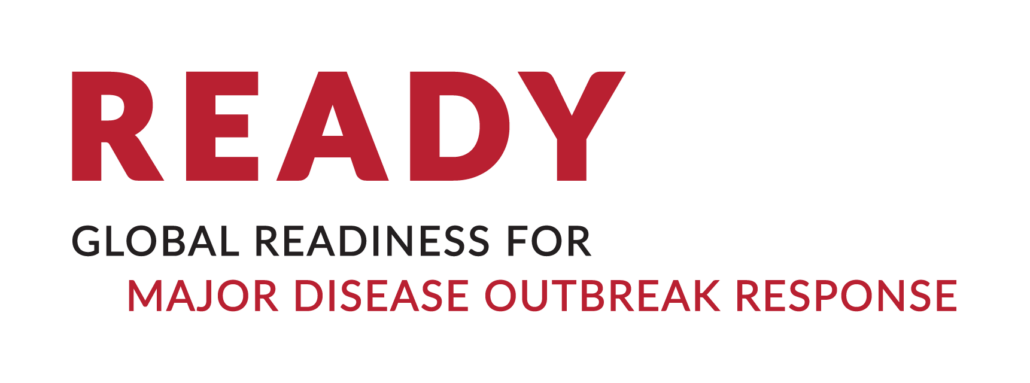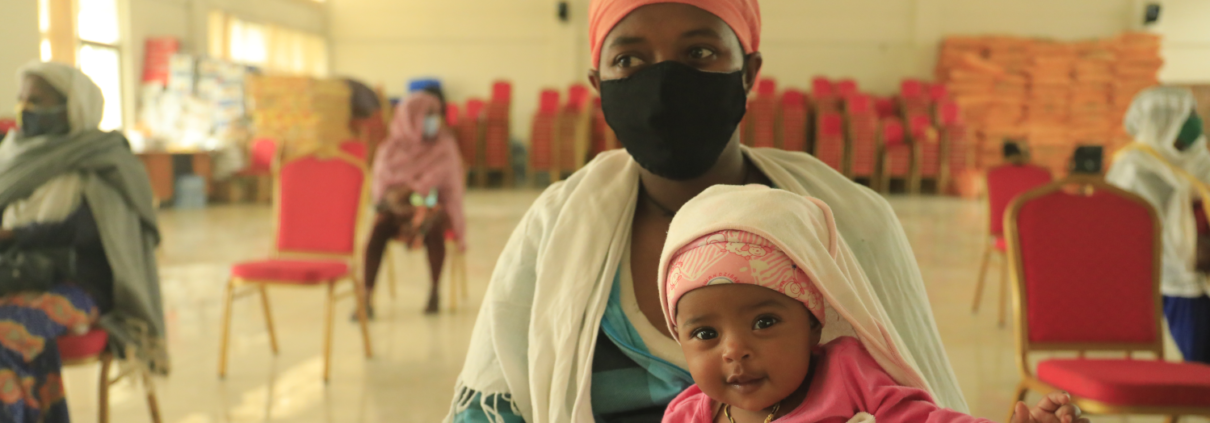Maternal, Newborn, and Reproductive Health in Emergencies (MNRHiE) and COVID-19: Successes, Challenges, and Next Steps
Wednesday, December 2, 2020 | 0800-0900 Washington/1300-1400 London | Panelists: Alice Janvrin, Independent Consultant; Ashley Wolfington, Global Health Consultant; Shehu Nanfwang Dasigit, IRC Sierra Leone; Donatella Massai, Lead Technical Advisor, READY
Abonnez-vous aux mises à jour PRÊT to receive future webinar announcements | View/download the expert consultation report discussed in this webinar
The health, economic, and social impacts of COVID 19 are felt worldwide and most critically by those at risk of exposure, severe forms of illness, mortality, and those facing the brunt of the economic downturn. The global community continues to fear the deprioritization of MNRHiE programs during COVID 19 preparedness and response, and there is a risk that existing inequalities in MNRHiE services will be exacerbated if we don’t act now.
In October 2020, the Bureau of Humanitarian Assistance (BHA)-funded READY initiative and the Inter Agency Working Group on reproductive health in crises (IAWG) led an expert consultation bringing together key MNRH and infectious disease stakeholders to share and compile experiences and lessons learned from the first phase of the response. This webinar will present the findings of these consultations, including:
- Successful adaptations and challenges of MNRHiE programs during COVID 19;
- Successes, challenges, and gaps in currently available COVID 19 tools and guidelines;
- The interaction between global and implementation levels, as related to MNRHiE programming;
- Recommendations to support MNRHiE services and actors to improve access and quality of care to vulnerable populations in future waves of COVID 19 and in future outbreaks.
PANÉLISTES
Alice Janvrin, Independent Consultant
Alice has ten years of international experience, with seven years setting up and running health and reproductive health programs in complex humanitarian contexts, including the Central African Republic, Chad, Nigeria and the Democratic Republic of Congo. As the Reproductive Health Coordinator for the International Rescue Committee, she piloted an integrated SRH and GBV program model in Nigeria and led numerous research and evaluation projects, including an assessment of the impact of Ebola on Sexual and Reproductive Health in DRC. Alice received her BSc in Psychology from Royal Holloway (University of London) and her Msc in International Health from the University of Copenhagen.
Ashley Wolfington, Global Health Consultant
Ashley has 15 years of public health and communication experience with expertise in sexual and reproductive health and HIV, and humanitarian and development programs and policy. She led the International Rescue Committee’s Sexual and Reproductive Health team for five years, leading a team of public health experts to deliver technical assistance to programs in 26 crisis-affected countries, including emergency preparedness and response. She is now working with IPPF, overseeing the development and delivery of their global humanitarian programme. She has an undergraduate degree in Political Science and French from Duke University and a MSc in Public Health from Colombia University.
Shehu Nanfwang Dasigit, Regional Public Health Specialist, IRC Sierra Leone
For over 11 years, Shehu N. Dasigit has been actively engaged in clinical and public health responses among vulnerable populations locally and internationally as a public health professional in reproductive, maternal, newborn, child and adolescent health (RMNCAH). He has participated in the implementation of PEPFAR project with Faith Alive Foundation and PMTCT Center Jos, Nigeria as ART/Peri-Op Nurse, overseeing the setup and management of the Operating Theater. He has also operated as clinical nurse at the American University of Nigeria (AUN), Yola, and supported in trainings and health awareness of the AUN community. Shehu is currently the regional public health specialist for IRC Sierra Leone, providing technical support to Health System Strengthening (HSS) RMNCAH projects. As a registered nurse and midwife, Shehu received a BSc in Nursing Science at the University of Jos, Nigeria, and an MSc in Public Health at Cavendish University Uganda.
Donatella Massai, Lead Technical Advisor, READY
For the past twenty years, Donatella has been engaged in international disaster response programs worldwide with a special focus on Emergency Health. She has participated in activities such as the reactivation of the Global Task Force on Cholera control, ZIKA preparedness and regional response in South and Central American for UNICEF, as Country Director and Medical Coordinator with Medécins Sans Frontierès, and General Director of International Organizations such as Greenpeace, Amnesty International and the Robert. F. Kennedy Foundation in Italy. With UNICEF, Donatella was the Emergency Health lead for the Cholera outbreak in Haiti and emergency health officer for the West and Central Africa region. She has conducted multiple research and evaluation projects in epidemics, including the after-action review for Save the Children’s Ebola Treatment Unit in Sierra Leone. Donatella received her MSc at the Faculty of Medicine, a major in health systems management from University La Sapienza in Rome, and her M.A in International Politics with a specialization in Human Rights at Paris XI-Faculté Jean Monnet, Droit-Economie.
Register for this webinar | Abonnez-vous aux mises à jour PRÊT to receive future webinar announcements | A recording will be available on this page after the webinar.


Ce site Web est rendu possible grâce au soutien du peuple américain à travers le Agence des États-Unis pour le développement international (USAID) dans le cadre de l’initiative READY. READY (pas un acronyme) est soutenu par l'USAID Bureau pour la démocratie, les conflits et l'assistance humanitaire, Bureau américain d'assistance en cas de catastrophe à l'étranger (OFDA) et est dirigé par Sauver les enfants en partenariat avec le Centre Johns Hopkins pour la santé humanitaire, le Centre Johns Hopkins pour les programmes de communication, Royaume-Uni-Med, Alliance ÉcoSanté, et Miséricorde Malaisie. Le contenu de ce site Web relève de la seule responsabilité de Save the Children. Les informations fournies sur ce site Web ne reflètent pas nécessairement les points de vue de l'USAID, de l'un ou de tous les partenaires du consortium, ou du gouvernement des États-Unis, et ne constituent pas des informations officielles du gouvernement américain.


